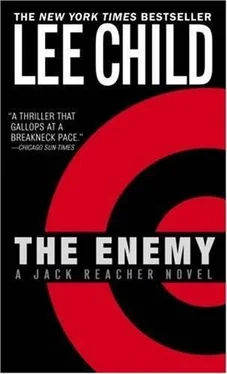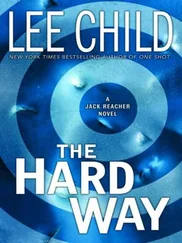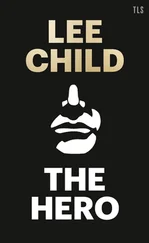“That’s just standard-issue bitching.”
“So maybe there’s more. We don’t know yet. Kramer’s heart attack made the whole thing misfire. For now.”
“You think they’ll start it up again?”
“Wouldn’t you? If you had everything to lose?”
She took one hand off the wheel. Rested it in her lap. Turned slightly and looked at me.
“So why do you want to see the Chief of Staff?” she asked. “If you’re right, then it’s the Vice-Chief who’s on your side. He brought you here. He’s the one who’s been protecting you.”
“Game of chess,” I said. “Tug-of-war. Good guy, bad guy. The good guy brought me here, the bad guy sent Garber away. Harder to move Garber than me, therefore the bad guy outranks the good guy. And the only person who outranks the Vice-Chief is the Chief himself. They always rotate, we know the Vice-Chief is infantry, therefore we know the Chief is Armored. Therefore we know he has a stake.”
“The Chief of Staff is the bad guy?”
I nodded.
“So why demand to see him?”
“Because we’re in the army, Summer,” I said. “We’re supposed to confront our enemies, not our friends.”
We gotquieter and quieter the closer we got to D.C. I knew my strengths and my weaknesses and I was young enough and bold enough and dumb enough to consider myself any man’s equal. But getting in the Chief of Staff’s face was a whole other ball game. It was a superhuman rank. There was nothing above it. There had been three of them during my years of service and I had never met any of them. Never even seen any of them, as far as I could remember. Nor had I ever seen a Vice-Chief, or an Assistant Secretary, or any other of the smooth breed who moved in those exalted circles. They were a species apart. Something made them different from the rest of us.
But they started out the same. I could have been one of them, theoretically. I had been to West Point, just like they had. But for decades the Point had been little more than a spit-shined engineering school. To get on the Staff track, you had to get sent on somewhere else afterward. Somewhere better. You had to go to George Washington University, or Stanford or Harvard or Yale or MIT or Princeton, or even somewhere overseas like Oxford or Cambridge in England. You had to get a Rhodes scholarship. You had to get a master’s or a Ph.D. in economics or politics or international relations. You had to be a White House Fellow. That’s where my career path diverged. Right after West Point. I looked at myself in the mirror and saw a guy who was better at cracking heads than cracking books. Other people looked and saw the same thing. Pigeonholing starts on day one in the military. So they went their way and I went mine. They went to the E-ring and the West Wing, and I went to dark dim-lit alleys in Seoul and Manila. If they came to my turf, they’d be crawling on their bellies. How I was going to do on their turf remained to be seen.
“I’m going in by myself,” I said.
“You are not,” Summer said.
“I am,” I said. “You can call it what you like. Advice from a friend, or a direct order from a superior officer. But you’re staying in the car. That’s for sure. I’ll handcuff you to the steering wheel if I have to.”
“We’re in this together.”
“But we’re allowed to be intelligent. This isn’t like going to see Andrea Norton. This is as risky as it gets. No reason for both of us to go down in flames.”
“Would you stay in the car? If you were me?”
“I’d hide underneath it,” I said.
She said nothing. Just drove, as fast as ever. We hit the Beltway. Started the long clockwise quarter-circle up toward Arlington.
Pentagon securitywas a little tighter than usual. Maybe someone was worried about Noriega’s leftover forces staging a two-thousand-mile northward penetration. But we got into the parking lot with no trouble at all. It was almost deserted. Summer drove a long slow circuit and came to rest near the main entrance. She killed the motor and jammed the parking brake on. She did it a little harder than she really needed to. I guessed she was making a point. I checked my watch. It was five minutes before midnight.
“Are we going to argue?” I said.
She shrugged.
“Good luck,” she said. “And give him hell.”
I slid out into the cold. Closed the door behind me and stood still for a second. The bulk of the building loomed up over me in the dark. People said it was the world’s largest office complex and right then I believed them. I started walking. There was a long ramp up to the doors. Then there was a guarded lobby the size of a basketball court. My special unit badge got me through that. Then I headed for the heart of the complex. There were five concentric pentagon-shaped corridors, called rings. Each one of them was protected by a separate checkpoint. My badge was good enough to get me through B, C, and D. Nothing on earth was going to get me into the E-ring. I stopped outside the final checkpoint and nodded to the guard. He nodded back. He was used to people waiting there.
I leaned against the wall. It was smooth-painted concrete and it felt cold and slick. The building was silent. I could hear nothing except water in pipes and the faint rush of forced-air heating and the guard’s steady breathing. The floors were shined linoleum tile and they reflected the ceiling fluorescents in a long double image that ran away to a distant vanishing point.
I waited. I could see a clock in the guard’s booth. It rolled past midnight. Past five after midnight. Then ten after. I waited. I started to figure my challenge had been ignored. These guys were political. Maybe they played a smarter game than I could conceive. Maybe they had more gloss and sophistication and patience. Maybe I was more than a little bit out of my league.
Or maybe the woman with the voice had thrown my message in the trash.
I waited.
Then at fifteen minutes past midnight I heard faraway heels echoing on the linoleum. Dress shoes, a staccato little rhythm that was part urgent and part relaxed. Like a man who was busy but not panicked. I couldn’t see him. The rap of his heels on the floor was billowing out at me around an angled corner. It ran ahead of him down the deserted corridor like an early warning signal.
I listened to the sound and watched the spot where it told me he would appear, which was right where the fluorescent tubes on the ceiling met their reflections in the floor. The sound kept on coming. Then a man stepped around the corner and walked through the flare of light. He kept on walking straight toward me, the rhythm of his heels unbroken, not slowing, not speeding up, still busy, not panicked. He came closer. He was the Chief of Staff of the Army. He was in formal evening mess dress. He was wearing a short blue jacket nipped in at the waist. Blue pants with two gold stripes. A bow tie. Gold studs and cuff links. Elaborate knots and swirls of gold braid all over his sleeves and his shoulders. He was covered with gold insignia and badges and sashes and miniature versions of his medals. He had a full head of gray hair. He was about five-nine and one-eighty. Exactly average size for the modern army.
He got within ten feet of me and I snapped to attention and saluted. It was a pure reflex action. Like a Catholic meeting the Pope. He didn’t salute back. He just looked at me. Maybe there was a protocol that forbade saluting while wearing the evening mess uniform. Or while bareheaded in the Pentagon. Or maybe he was just rude.
He put his hand out to shake.
“Very sorry I’m late,” he said. “Good of you to wait. I was at the White House. For a state dinner with some foreign friends.”
I shook his hand.
“Let’s go to my office,” he said.
Читать дальше












